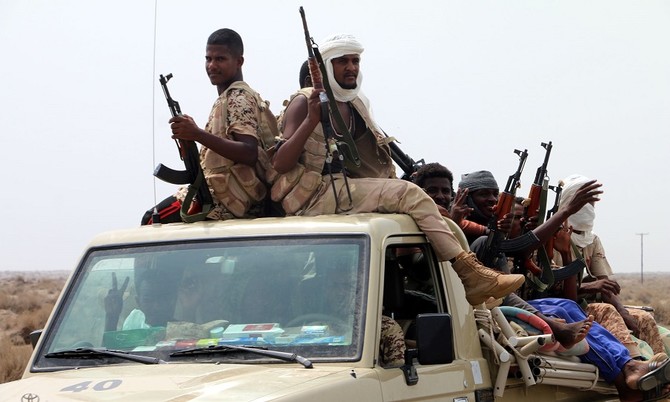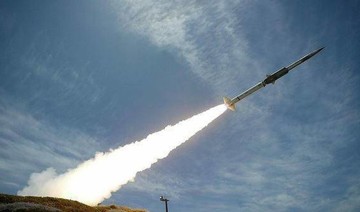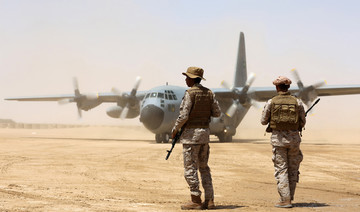ADEN: Troops backed by the Saudi-led coalition reached the outskirts of Yemen’s main port city of Hodeidah’s airport on Wednesday.
The coalition launched an assault on Hodeidah earlier, in the biggest battle of the three-year war between the alliance of Arab states and the Iran-aligned Houthis.
Coalition warplanes and warships were carrying out strikes on Houthi fortifications to support ground operations by Yemeni troops massed south of the Red Sea port, the internationally recognized Yemeni government said in a statement.
The “Golden Victory” operation began after the passing of a deadline set by the United Arab Emirates for the Houthis, who hold the capital Sanaa, to quit the sole port under their control.
Hodeidah is the lifeline for the majority of Yemen’s population, who live in Houthi territory.
Houthi leader Mohammed Ali Al-Houthi, who has threatened attacks on oil tankers along the strategic Red Sea shipping lane, warned the Western-backed alliance not to attack the port and said on Twitter his forces had targeted a coalition barge.
Houthi-run Al Masirah TV said two missiles struck the barge, but there was no immediate confirmation from the coalition.
The United Nations had been trying to get the parties to reach a deal that would avert an attack on Hodeidah, which it fears would further impede Yemenis’ access to food, fuel and medicine, exacerbating the world’s most urgent humanitarian crisis in the impoverished Arab state.
It estimates that 600,000 people live in the area, and in a worst-case scenario, a battle could cost up to 250,000 lives, as well as cutting off aid and other supplies to millions of people facing starvation and disease.
The assault on Hodeidah is the first time the Saudi-led Arab coalition Western-backed coalition have attempted to capture such a well-defended major city, with the aim of boxing in the Iran backed Houthis in Sanaa and cutting their supply lines to force them to the negotiating table.
Turning point
The alliance intervened in Yemen to restore the government of President Abd-Rabbu Mansour Hadi and thwart what Riyadh and Abu Dhabi see as the expansionist aims of their Shiite foe, Iran.
“The liberation of Hodeidah port is a turning point in our struggle to recapture Yemen from the militias that hijacked it to serve foreign agendas,” the Yemeni government said in a statement carried by state-run media.
“The liberation of the port is the start of the fall of the Houthi militia and will secure marine shipping in Bab Al-Mandab strait and cut off the hands of Iran, which has long drowned Yemen in weapons that shed precious Yemeni blood.”
The Houthis deny they are Iranian pawns and say their revolt aims to target corruption and defend Yemen from invaders.
Yemen lies beside the southern mouth of the Red Sea, one of the most important trade routes in the world for oil tankers, which navigate near Yemen’s shores while heading from the Middle East through the Suez Canal to Europe.
Reactions to the ‘Golden Victory’ operation to re-take Hodeidah have been muted, apart from the UN. Lise Grande, UN resident and humanitarian coordinator for Yemen, speaking by telephone from the capital Sanaa, said that her office was drawing up options to ensure aid delivery to millions of Yemenis “in case of a possible siege of Hodeidah,” including a humanitarian airlift.
“We are distributing food, hygiene, nutritional supplies and shelter materials. We have a ship offloading food even as shelling and bombing is happening,” Grande said. “The UN is already taking steps in case of a possible siege including airlift capability.”
Yemeni President Abed Rabbo Mansour Hadi has called Wednesday for a speedy liberation of Hodeidah to spare its people from catastrophe. Hadi added that the Yemeni government offered numerous concessions trying to persuade the Houthi militia to withdraw from Hodeidah to prevent a military show down there, but the militia refused.
Prince Khalid bin Salman bin Abdul Aziz, the Saudi ambassador to Washington, said on his Twitter account that “operations to liberate the city of Hodeidah are a continuation of the support delivered by the Saudi-led Arab coalition to the Yemeni people, and a way to support their freedom against the militia supported by Iran bent on sowing chaos and destruction in the country.
Yemeni forces on Wednesday got closer to Hodeidah after taking control of the suburb of Nekheila south of the town and the port of Hodeidah.
The Saudi ambassador to Washington added in a separate tweet that the Saudi-led coalition’s operations to re-take Hodeidah are important in the light of the increased threat the militias controlling the port have been posing for maritime security in the Red Sea.
Reem Al-Hashimy, the UAE minister of state for international cooperation, has said if the port is wrested from the Houthis, the coalition could ease controls aimed at denying the group arms and ease the flow of goods and aid into Yemen, where millions face starvation and disease.
Riyadh says the Houthis use the port to smuggle Iranian-made weapons, including missiles that have targeted Saudi cities — accusations denied by the group and Iran.
Saudi-led coalition reaches outskirts of Yemen’s Hodeidah airport
Saudi-led coalition reaches outskirts of Yemen’s Hodeidah airport

- Hodeidah is the lifeline for the majority of Yemen's population, who live in Houthi territory
- Riyadh says the Houthis use the port to smuggle Iranian-made weapons
Gaza baby rescued from dead mother’s womb dies

- Doctors were able to save the baby, delivering her by Caesarean section
- The baby suffered respiratory problems and a weak immune system, said Doctor Mohammad Salama who had been caring for Sabreen Al-Rouh
RAFAH, Gaza Strip: A baby girl who was delivered from her dying mother’s womb in a Gaza hospital following an Israeli airstrike has herself died after just a few days of life, the doctor who was caring for her said on Friday.
The baby had been named Sabreen Al-Rouh. The second name means “soul” in Arabic.
Her mother, Sabreen Al-Sakani (al-Sheikh), was seriously injured when the Israeli strike hit the family home in Rafah, the southernmost city in the besieged Gaza Strip, on Saturday night.
Her husband Shukri and their three-year-old daughter Malak were killed.
Sabreen Al-Rouh, who was 30-weeks pregnant, was rushed to the Emirati hospital in Rafah. She died of her wounds, but doctors were able to save the baby, delivering her by Caesarean section.
However, the baby suffered respiratory problems and a weak immune system, said Doctor Mohammad Salama, head of the emergency neo-natal unit at Emirati Hospital, who had been caring for Sabreen Al-Rouh.
She died on Thursday and her tiny body was buried in a sandy graveyard in Rafah.
“I and other doctors tried to save her, but she died. For me personally, it was a very difficult and painful day,” he told Reuters by phone.
“She was born while her respiratory system wasn’t mature, and her immune system was very weak and that is what led to her death. She joined her family as a martyr,” Salama said.
More than 34,000 Palestinians, many of them women and children, have been killed in the six-month-old war in Gaza between Israel and Hamas militants, according to the Gaza health ministry. Israel denies deliberately targeting civilians in its campaign to eradicate Hamas.
Much of Gaza has been laid to waste by Israeli bombardments and most of the enclave’s hospitals have been badly damaged, while those still operating are short of electricity, medicine sterilization equipment and other supplies.
“(Sabreen Al-Rouh’s) grandmother urged me and the doctors to take care of her because she would be someone that would keep the memory of her mother, father and sister alive, but it was God’s will that she died,” Salama said.
Her uncle, Rami Al-Sheikh Jouda, sat by her grave on Friday lamenting the loss of the infant and the others in the family.
He said he had visited the hospital every day to check on Sabreen Al-Rouh’s health. Doctors told him she had a respiratory problem but he did not think it was bad until he got a call from the hospital telling him the baby had died.
“Rouh is gone, my brother, his wife and daughter are gone, his brother-in-law and the house that used to bring us together are gone,” he told Reuters.
“We are left with no memories of my brother, his daughter, or his wife. Everything was gone, even their pictures, their mobile phones, we couldn’t find them,” the uncle said.
UN denounces ‘more serious’ Iran crackdown on women without veils

- Hundreds of businesses including restaurants and cafes have been shut down for not enforcing the hijab rule
- More women began refusing the veil in the wake of the 2022 death in custody of 22-year-old Mahsa Amini
GENEVA: The United Nations said Friday that it was concerned by reports of new efforts to track and punish Iranian women, some as young as 15, who refuse to wear the headscarf required under the country’s Islamic law.
The UN Human Rights Office also expressed alarm about a draft bill on “Supporting the Family by Promoting the Culture of Chastity and Hijab,” which would impose tougher sentences on women appearing in public without the hijab.
“What we have seen, what we’re hearing is, in the past months, that the authorities, whether they be plainclothes police or policemen in uniform, are increasingly enforcing the hijab bill,” Jeremy Laurence, a spokesman for the office, said at a press conference.
“There have been reports of widespread arrests and harassment of women and girls — many between the ages of 15 and 17,” he said.
Iranian police announced in mid-April reinforced checks on hijab use, saying the law was increasingly being flouted.
Hundreds of businesses including restaurants and cafes have been shut down for not enforcing the hijab rule, and surveillance cameras are being used to identify women without it, Laurence said.
More women began refusing the veil in the wake of the 2022 death in custody of 22-year-old Mahsa Amini after her arrest by Iran’s morality police for allegedly breaking the headscarf law, which sparked a wave of deadly protests against the government.
Laurence said that on April 21, “the Tehran head of the Islamic Revolutionary Guard Corps announced the creation of a new body to enforce existing mandatory hijab laws, adding that guard members have been trained to do so ‘in a more serious manner’ in public spaces.”
And while the latest draft of the new hijab bill has not been released, “an earlier version stipulates that those found guilty of violating the mandatory dress code could face up to 10 years’ imprisonment, flogging, and fines,” he said, adding that “this bill must be shelved.”
The Human Rights Office also called for the release of a rapper sentenced to death for supporting nationwide protests sparked by Amini’s death.
Toomaj Salehi, 33, was arrested in October 2022 for publicly backing the uprising.
“All individuals imprisoned for exercising their freedom of opinion and expression, including artistic expression, must be released,” Laurence said.
UN seeks to deescalate Sudan tensions amid reports of possible attack

- UN Secretary-General Antonio Guterres’ envoy is engaging with all parties to deescalate tensions
UNITED NATIONS: The United Nations is increasingly concerned about escalating tensions in Al-Fashir in Sudan’s North Dafur region amid reports that the Rapid Support Forces are encircling the city, signaling a possible imminent attack, the UN’s spokesperson said on Friday.
UN Secretary-General Antonio Guterres’ envoy is engaging with all parties to deescalate tensions in the area, the spokesperson said.
Israeli army says missile fire kills civilian near Lebanon

- The violence has fueled fears of all-out conflict between Iran-backed Hezbollah and Israel
- “Overnight, terrorists fired anti-tank missiles toward the area of Har Dov in northern Israel,” the Israeli army said
JERUSALEM: The Israeli army said Friday a civilian was killed near the country’s northern border with Lebanon, as near-daily exchanges of fire with Hezbollah rage.
Both sides have stepped up attacks this week, with Hezbollah increasing rocket fire and Israel saying it had carried out “offensive action” across southern Lebanon.
The violence has fueled fears of all-out conflict between Iran-backed Hezbollah and Israel, which last went to war in 2006.
“Overnight, terrorists fired anti-tank missiles toward the area of Har Dov in northern Israel,” the Israeli army said, referring to the disputed Shebaa Farms district.
“As a result, an Israeli civilian doing infrastructure work was injured and he was later pronounced dead.”
Israeli media reported that the victim was an Arab-Israeli truck driver. Police told AFP they had not identified the body, but said it was the only one found after a truck was hit.
Hezbollah said it had destroyed two Israeli vehicles in the Kfarshuba hills overnight in a “complex ambush” on a convoy using missiles and artillery.
The Israeli army did not comment directly on the claim.
It said Israeli fighter jets struck Hezbollah targets around Shebaa village in southern Lebanon including a weapons store and a launcher, while soldiers “fired to remove a threat in the area.”
It said fighter jets also “struck Hezbollah operational infrastructure in the area of Kfarshuba and a military compound in the area of Ain El Tineh in southern Lebanon.”
Lebanon’s official National News Agency reported that Shebaa village, Kfarshuba and Helta were targeted by “more than 150 Israeli shells,” leaving homes damaged.
Iran-backed Hezbollah has been trading almost-daily fire with the Israeli army since the day after its Palestinian ally Hamas carried out an unprecedented attack on Israel on October 7.
Since October 8 at least 380 people have been killed in Lebanon, including 252 Hezbollah fighters and dozens of civilians, according to an AFP tally.
Israel says 11 soldiers and nine civilians have been killed on its side of the border.
Tens of thousands of people have been displaced on both sides.
EU commits $73 million more for Gaza aid

- New EU aid would be focused on food deliveries, clean water, sanitation and shelters
- The EU and United States have demanded that Israel allows more aid into Gaza
BRUSSELS: The European Union on Friday said it was giving an extra 68 million euros ($73 million) to provide desperately needed aid to Palestinians in Gaza.
The territory has been devastated by more than six months of Israeli bombardment and ground operations after Hamas’s October 7 attack, leaving the civilian population of two million people in need of humanitarian assistance to survive.
“In light of the continued deterioration of the severe humanitarian crisis in Gaza, and the steady rise of needs on the ground, the (European) Commission is stepping up its funding to support Palestinians affected by the ongoing war,” an EU statement said.
“This support brings total EU humanitarian assistance to 193 million euros for Palestinians in need inside Gaza and across the region in 2024.”
The EU said the new aid would be focused on food deliveries, clean water, sanitation and shelters, and would be channelled through local partners on the ground.
The United Nations has said Israel’s operation has turned Gaza into a “humanitarian hellscape,” amid fears of a looming famine.
The EU and United States have demanded that Israel allows more aid into Gaza.
The US military said on Thursday it had begun construction of a pier meant to boost deliveries to the territory.
The war in Gaza began with an unprecedented Hamas attack on Israel on October 7 that resulted in the deaths of about 1,170 people in Israel, according to an AFP tally of Israeli official figures.
Israel vowed to destroy Hamas, with a retaliatory offensive that has killed at least 34,356 people in Gaza, mostly women and children, according to the Hamas-run territory’s health ministry.























